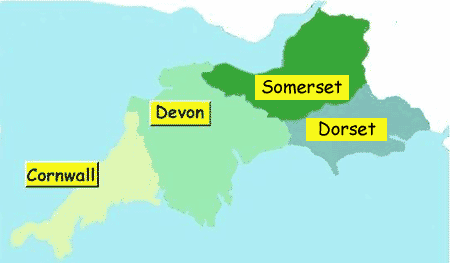English Roots
 Sometimes when I meet a person from the UK I tell them that I too have roots that extend back to their blessed isle. And the question that always follows is, "Oh yeah, from where?" - as if British people from Liverpool were any different from British people in Brighton. I try to explain to these poor chaps that our English roots came over long before limeys found a predilection for the exquisite green citrus fruit. But, being nosy by nature, I decided to think about it, and dig in, and try to find an answer to this question. Where oh where did my limey blood spring from? Are there actual places in England where long distant relatives of mine, and Marta's, live - watching East Enders and thinking Manchester U. It's possible. We're all relatives right?
Sometimes when I meet a person from the UK I tell them that I too have roots that extend back to their blessed isle. And the question that always follows is, "Oh yeah, from where?" - as if British people from Liverpool were any different from British people in Brighton. I try to explain to these poor chaps that our English roots came over long before limeys found a predilection for the exquisite green citrus fruit. But, being nosy by nature, I decided to think about it, and dig in, and try to find an answer to this question. Where oh where did my limey blood spring from? Are there actual places in England where long distant relatives of mine, and Marta's, live - watching East Enders and thinking Manchester U. It's possible. We're all relatives right?But the history of our English roots is pretty fascinating. To set the stage let me take you back in time to the first half of the 17th Century. Better yet - go rent New World starring Colin Farrell and Christian Bale. You won't regret it. This was the world of our English roots - hacking their way into the wilderness south from Jamestown into what is now the indepent city of Suffolk, Virginia, Gates County, North Carolina, and Southampton County, Virginia. This area - part of what is called Tidewater Virginia - was settled during the 17th Century by English colonists.
These were an ambitious, deeply religious people - though not as religious as the Puritans of Massachusetts. Still - each family multiplied greatly with each generation. One man could have six or seven sons and five daughters and so on and so on. It is for this reason that Marta and I are related to our fair share of famous southerners - George Durant the "father of North Carolina" is among our forebears. We're related to - as far as I know - two sons of the south that became presidents, too. Both Jimmy Carter and Lyndon Baines Johnson are distant cousins of ours.
When it comes to chopping this ancient lineage up, it really comes down to a cast of hundreds of settlers, although in-breeding definitely makes the family tree smaller than it would appear. But among the settlers I can say for a fact that most came from three places in England - starting with the West Country - Sommerset, Devon, and Cornwall.
The second area where many settlers in our family came from was Yorkshire and Northumbria in England. While Yorkshire has had immense Scandinavian influence throughout the years, the West Country was the last stronghold of the Celtic Britons following the Anglo-Saxon invasion. Finally, a place that many came from wasn't even English. It was Wales. Most of our relatives come from these three places.
The Pittmans and Howells (two of the closest names in our English side) came originally from Wales. The first Howell in our part of Virginia was named Etheldred Howell. He was from what is now Flintshire in northern Wales. The first Pittman was Captain Thomas Pittman - and he is probably the most symbolic of the settlers.
Thomas Pittman was born in Monmouthshire, Wales in 1614. He was in Virginia by 1650 and was a captain in the militia there. Living on the Virginian frontier at a time of great instability he - and most of the men that we claim as English forebears - were involved in a very famous rebellion - Bacon's Rebellion a colonial uprising by the back country farmers against the wealthier farmers of Virginia, a full-scale class rebellion.
The rebellion was put down and Thomas Pittman was pardoned for his actions, as were many of our English forefathers. I have to say that - as of that moment - it seems like they stopped being English though, and started being fully American.
After that there were revolutions and civil wars and ... by the time I came around any connection to the land of Monty Python was long forgotten. About a fifth to a quarter of my ancestors are limeys though - making the influence in Marta even less. But we speak their language don't we? That perhaps is their greatest legacy of all.


2 Comments:
Where does this word limey come from?
It comes from the historical British naval practice of supplying its sailors with lime juice to prevent the disease scurvy.
Post a Comment
<< Home